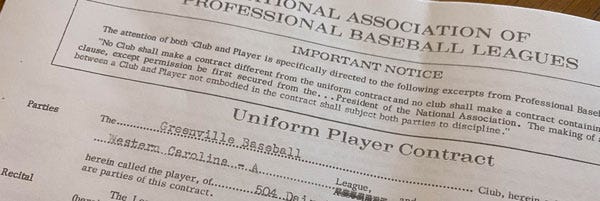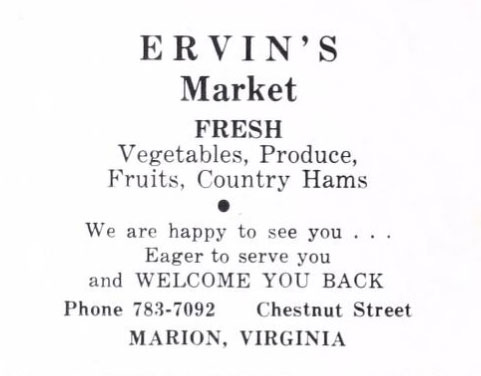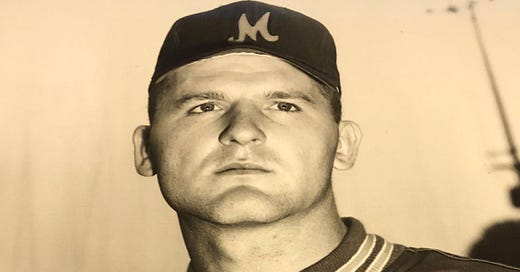Meet your Marion Christmas parade grand marshal
A Q&A with Jim McGregor, catcher for the 1967 Marion Mets
Marion Mets on Substack: Issue No: 7
Ohio native Jim McGregor is in Marion this week to serve as grand marshal for the town’s 2022 Christmas parade. He’ll also attend the tree lighting tonight (Dec. 1). At these events, Jim is representing the 400-plus players who took the field for the Marion Mets from 1965 to 1976.
Jim was a catcher for Marion in 1967, playing under the guidance of skipper Birdie Tebbetts, a former major league all-star catcher and big-league manager for the Cincinnati Reds and Cleveland Indians. Jim’s and Birdie’s Marion Mets finished in second place in the Appalachian League in ’67, the Mets’ third season in Marion. Four players from that team – Charlie Hudson, Jesse Hudson, Ted Martinez and Tommy Moore – went on to play Major League Baseball.
I talked with Jim on the phone a few weeks (October 26, 2022) before his trip back to Marion, which, as you’ll learn, is not the first time he’s revisited the town since he played here.
Here’s some of our conversation, which has been lightly edited for length and clarity. I hope you enjoy it and will consider subscribing to this free newsletter.
Q: You are serving as the grand marshal for Marion’s 2022 Christmas parade. How did that materialize?
A: My sons and three grandchildren live in Greenville, South Carolina. I was visiting them back in May [2022], and my granddaughter asked her father, ‘Dad, how’d I get my name?’ Her name is Brodie, B-R-O-D-I-E. And he said, ‘Let your Papa [Jim is Papa] tell you how that happened.’
I said, ‘Well, I played ball in Marion, Virginia, in 1967, and we had an outfield fence with a lot of advertisements on it, and one that caught my eye was Brodie Thompson Goodyear Tire.’
Every night I would see it, and I started liking that name so much that when we had our first child, I named him Scott Brodie. So, my son’s middle name is Brodie. When he got married and had his children — he had twin girls — he named the first one Aubrey and named the second one Brodie. So, that’s what started all of this.
I said to them, ‘I wonder if they’re still in business because that was in 1967.’
I went online, and sure enough, there was Thompson Tire. I said, ‘What the heck, I’m going to call them just for the fun of it.’ I never met Brodie Thompson.
So, I called and said, ‘Can I speak to Brodie Thompson,’ and they [person on the other end of the phone] said ‘He’s deceased, but his son is here, and he’s the president of the company, Bill Thompson.’
They put me on the phone with Bill Thompson, and I told him what had happened, and he went bananas, [Jim chuckled] and he thought it was so cool that I called after all these years.
We talked for a while and just had a really nice chat. So, we said maybe we’ll stay in touch.
My granddaughter, Aubrey, is living in Charlotte (N.C.). My son and I went up to visit her [from Greenville, S.C.] the next day and we took two cars. [Afterward] I said, ‘Scott, you take your car back to Greenville, I’m going to keep going back to the Cincinnati area.’
I’m from Harrison, Ohio, and I looked at a map and saw that Marion is almost on the way back. So, I decided to go to Marion and spend the night and see Bill Thompson the next morning.
I spent the night in Atkins, and the next morning, I went down to Bill’s tire shop. I walked in and said ‘I’m looking for Bill Thompson,’ and he said, ‘You’re talking to him.’
We must have talked two, two and a half hours, maybe more. I just enjoyed talking to Bill so much. He’s such a gentleman, and what an ambassador he is for Marion.
About a week or two later, I got a call from Bill, and he said, ‘Would you consider doing us a favor and be the grand marshal for our Christmas parade?’
I said, ‘Bill, I was just one of the players. I wasn’t anything special.’
He said, ‘That’s not the point. Would you mind representing all the guys who played for the Mets here in Marion?’
With that being the case, I said it would be an honor to represent the former players.
A couple of weeks later, I got a call from Bill, and he asked if I would consider coming up and bring my family for the day before the parade and attending the Christmas tree lighting
That’s pretty much how it happened. My family is very excited about it.
Q: When did you start playing baseball, and how did you become a catcher?
A: Oh, you’re going to love this one. We [Jim and his parents] moved from out in the country to a town called Harrison [Ohio], right on the Indiana-Ohio line. When I was about 9 or 10 years old, I met a few new kids who were playing baseball. C Knothole was what it was called, and you had to be at least 9 or 10 years old to play. It looked kind of neat to me, but I didn’t think too much about it because we didn’t have any baseball out in the country. One night, dad came home from the local tavern, and he said ‘Would you like to play on a baseball team?’
I said ‘Yeah, I sure would.’
He said, ‘Well, come with me.’
We went down to the tavern, and there was a guy there named Tip Bittle and he said to me, ‘You ever catch before?’
I thought he meant did I ever toss and catch, and I said ‘Yeah sure.’
He said, ‘My son, our catcher, doesn’t want to be a catcher; he wants to be an outfielder. So, I need a catcher.’
So, then I knew he was talking about being a catcher.
Coincidentally, when we left living in the country, our landlord’s son had played high school ball and he gave me a catcher’s mitt, which was a big, black, heavy catcher’s mitt that only had a pocket the size of a baseball.
Q: Did you like catching?
A: I loved it because you touch the ball on every pitch, just about. You have to align the fielders and talk to them, and call the pitches, and remind players how many outs there are. You’re running the game. You’re the quarterback of the team. I liked that.
Q: I love catcher’s mitts. What can you tell me about your mitt?
A: It was the same glove I used at Ohio University. I used it during my career there. I was allowed to take it with me. All the players [at Ohio U.] had to bring their own gloves, except for catchers and first basemen. Those were specialty gloves, and the university paid for those. And, they let us keep them when we left. I still have it, and I’m going to bring it and give it to Bill [Thompson] to put in the [Smyth County] museum [in Marion] for a while. I also have my bat that I’m bringing, which is nice because it says Marion Mets on it.
Q: Did you play any other positions?
A: I played first base some. Maybe just one time with Marion. We were playing the Johnson City Yankees, and our first baseman got hurt and Birdie Tebbetts said, ‘Can anyone here play first base?’ [Jim volunteered.] The first pitch was a grounder hit to me, and it went through my legs. I can’t understand why Skipper Tebbetts didn’t put me in there again.

Q: How did you become a player in the New York Mets organization?
A: There was a Mets scout named Lloyd Gearhart and the Mets were in town, in Cincinnati and I got a call from Lloyd. He said, “I’d like to sign you for a contract with the Mets. Meet me down at the Reds game. We’ll get you a ticket.’ And they signed me to a contract then, and so I went [to Marion] the next spring.
[NOTE: Gearhart managed the Marion Mets in 1968.]
Q: How did Gearhart and the New York Mets know about you?
A: I think it must have been Stan Sanders, the head coach at the University of Toledo, who had been an assistant coach at Ohio. As assistant coach, you know a lot of scouts. I know the Mets were looking for catchers. That was a big deal back in those days, They [New York Mets] needed catching. Lloyd must have asked Stan if he knew any catchers, and Stan must have given him my name. He [Gearhart] probably did his own research after that and said ‘this guy may be worth a shot.’

Q: What was your time like in Marion?
A: I was married at the time. We lived in an apartment we rented from a guy named Roy Repass. I think he was a retired business man in town, and he only came back to town on Mondays, Tuesdays and Wednesdays. He and his wife were really nice people.
My wife, Cathy, enjoyed Marion. There were a couple of other players who were married. The wives would all sit together at the games. We’d socialize with a couple of the other players and their wives, but we didn’t have much time to do much of that. We enjoyed going downtown. There was place [Ervin’s Market] with a sawdust floor – it was probably a produce place – but we enjoyed going there and letting our feet cool off in the sawdust.
We’d go to Hungry Mother Park every once in a while, and just ride around the area. It’s so beautiful there.

Q: What was a typical day like for home games?
A: I’d have to get to the ballpark early for prep. We’d have warm-ups, infield practice and shag fly balls and little batting practice before the game. Just typical baseball routines.
You’re going to laugh. It seems like almost every day it rained, and we didn’t know if we would play or not. But, it would quit raining, and Jimmy Plummer and whoever his boss was, would have the field ready. It had a lot of red sand and it absorbed pretty well, and so by game time the field was perfect and ready to play.
[Note: When you mention the Marion Mets to anyone who was around during the team’s time in Marion, two names are almost always mentioned: Nolan Ryan, who played in Marion in 1965, and James Raymond “Jimmy” Plummer. He began working with the Marion team as a teenager and worked his way to a position with the major league’s New York Mets.]
Jimmy was a great guy. He was 14 by the time I was there. I think he started [with the Marion Mets] when he was 12, two years earlier. I just loved the kid. He liked me for some reason. I guess it was because he found out I had already coached high school ball for a year and probably knew a little more than some of the other guys because most of them were just out of high school. [Jim was 23 when he played in Marion.]
Anyway, he asked me about the distances to the bases and all that stuff, and I knew the answers, and he was just flabbergasted that I knew the answers. Every night he would come up to me and ask me questions [about baseball]. He just couldn’t believe I knew the answers. We were pretty tight.
I found out that he died in 2008. I wish I had known. What a loss. What a great kid he was.
Q: Birdie Tebbetts was your manager in Marion. What fond memories do you have of Birdie?
A: Birdie had a heart attack [on April 1, 1964, at age 52] and he was trying to make a comeback to baseball. And, so they [New York Mets] said ‘OK, we’ll give you a shot. We’ll send you down to Marion, and you can manage a minor league team.’
They were concerned about his health. He would walk every day, and sometimes his wife would walk with him.
Birdie would walk in the outfield before games while players were shagging fly balls and such, just to get some exercise and build some strength. Later in the season, he talked to me, he knew I had coached high school ball. [Jim coached high school baseball before playing minor league baseball.]
He said, ‘Hey, McGregor, come and walk with me.’
One of the problems with the rookie leagues back then was you had a lot of players at each position, and teams just weeded people out. We started with six catchers, so I started every six games like the other catchers did. And then maybe after the first or second week, they’d send one catcher home just the same as every other position.
Late in the season, I’m one of the last two, and I hadn’t caught that many games because of the rotation and, in baseball, you just can’t keep an edge unless you’re playing almost every day. It’s just impossible. Plus, I had broken my ring finger on my right hand about a few weeks before spring training started [in Winter Haven, Florida], which was in June. I was coaching high school ball, and I went to work out with an American Legion team. I got a foul tip off my finger and broke it. I had it in a splint until about two weeks before I left for Marion, so I wasn’t in very good shape [finger-wise] anyway.
So, Birdie said ‘the reports are in and you won’t be getting released, but you won’t be getting a renewal for next year.’
I said, ‘Well, I understand.’
He asked, ‘What are you going to do?’
I told him, ‘I’m coaching high school ball now. I’d like to coach at the college level. And, then we just talked in generalities. That was awfully nice of him to talk to me. He didn’t have to do that. I really appreciated it. He was a good man.
Q: What’s one memory of playing in Marion that stands out to you?
A: Bob Garnett was the P.A., and before every game, he would say: “Welcome to Marion Stadium, home of the Mets, where the stars of tomorrow shine tonight.” As a player out there, you get all puffed up when you hear that. Oh, gosh, yeah! That’s so cool!
Q: What did you do after playing for the ’67 Marion Mets?
A: I taught and coached at Harrison for two years before taking a job as plant superintendent at a mobile home factory. I worked there eight months, and I went up to [The University of] Toledo because the [baseball] head coach there had been an assistant at Ohio U. when I was there. He had told me if he ever got a college job, he would want me for his assistant. I had forgotten about that, but I went up to see him about a kid I coached at Harrison. He said, ‘Do you remember what I told you back when you were a senior [in college]?’
I said ‘Refresh my memory.’
He said, ‘I want you to be my assistant.’
So, I quit my job at the mobile home factory and went to Toledo as an assistant for three years. And, then I went back to public schools in Cincinnati and taught. I picked up my master’s degree in guidance at Toledo and took extra courses in administration and got my principal certificate. Throughout my career, I became an assistant principal, a principal and an assistant superintendent. I had 40-some years in education.
- 30 -
That’s all for now. But before you go, I want to remind you that I’m always looking for stories about the Marion Mets. If you were a player, fan, ball boy, concession stand work… anything… and have a story to share, I’d love to talk with you. You can reach me at chadoz97@gmail.com.
See ya next week!





nicely done! Am enjoying your pieces.